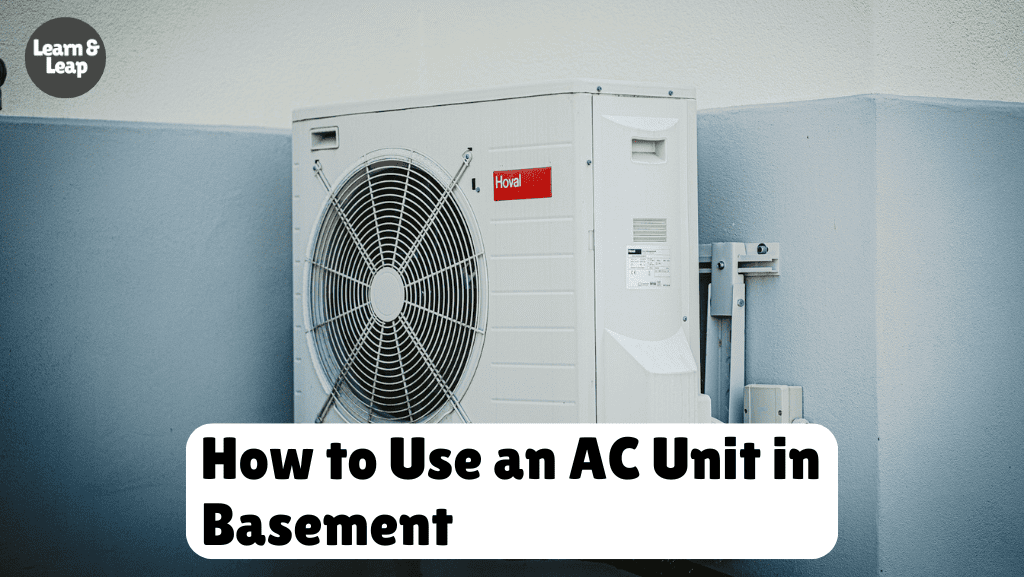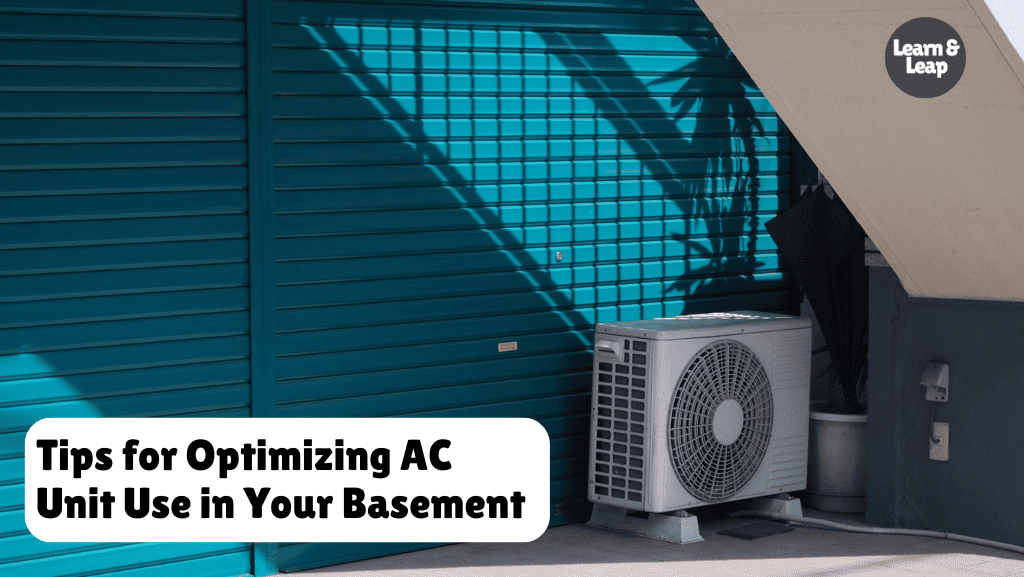
Table of Contents
How to Use an AC Unit in Basement
When it comes to keeping your basement cool, using an air conditioner effectively can make all the difference. Basements are notorious for being tricky to cool, often suffering from poor ventilation and high humidity. But with the right approach, you can transform your basement into a comfortable, refreshing space.
In this post, we’ll guide you through how to use an AC unit in your basement, explain the best options for basement cooling, and provide tips to make the process easier. Whether you’re installing a portable unit or upgrading your central air system, we’ve got you covered.
To use an AC unit in a basement, choose the right type of unit—such as a portable air conditioner, window unit, or ductless mini-split—and ensure proper airflow and humidity control. Consider adding insulation and sealing any leaks to prevent cool air from escaping.
Please read on for detailed steps on how to use an ac unit in basement by choosing and optimizing your basement AC unit.
Why You Need to Cool Your Basement
Basements tend to trap heat and moisture, which can lead to uncomfortable living conditions, mold growth, and damage to belongings. A basement that’s too warm can make the entire house feel hotter. By using an air conditioner in your basement, you can reduce humidity, control temperatures, and create a more livable space. Plus, it can help preserve any items you’re storing down there, especially electronics, furniture, and important documents.
Now, let’s dive deeper into the different types of AC units you can use in a basement and how to optimize their performance.
Choosing the Right AC Unit for Your Basement
When it comes to selecting an air conditioning unit for your basement, you have several options, each with its pros and cons. Here’s a detailed breakdown of the best types:
1. Portable Air Conditioners
Portable air conditioners are a popular choice for basements because they are easy to install and don’t require any permanent changes to your home.
- Ease of Use: These units can be moved from one area of the basement to another, making them versatile.
- Installation: They typically require a venting hose to expel warm air, which can be directed out of a window or through an opening in the wall.
- Pros: Portable, simple to set up, and ideal for small to medium-sized basements.
- Cons: Not as efficient as other options; may require frequent emptying of the condensation tank.
To make the most of a portable AC unit, position it near an external vent or window to avoid trapping heat in the basement.
2. Window Air Conditioners
If your basement has windows, a window AC unit could be a great option.
- Efficiency: Window units tend to be more powerful than portable ones, cooling down spaces faster.
- Installation: These units fit into your basement windows, venting out the hot air while cooling the inside.
- Pros: Efficient and cost-effective; works well in basements with windows.
- Cons: Requires a window, which not all basements have; might block natural light.
If your basement has a small window, a window unit could be the most energy-efficient way to cool the space.
3. Ductless Mini-Split Systems
Ductless mini-split systems are highly efficient and allow you to cool specific areas of your basement without needing existing ductwork.
- Cooling Power: These systems can cool large spaces quickly and are more energy-efficient than portable or window units.
- Installation: Professional installation is required, as the system includes an outdoor compressor and an indoor unit connected by refrigerant lines.
- Pros: Energy-efficient, quiet, and effective for large basements.
- Cons: Expensive upfront cost and requires professional installation.
For those looking to cool a finished basement or create a livable space, a ductless mini-split might be the best long-term solution.
4. Central Air Conditioning
If you already have a central AC system, you can extend it to your basement by installing ducts and vents.
- Efficiency: Central air provides consistent cooling throughout the home, including the basement.
- Installation: Extending your central air system may require professional assistance to ensure proper airflow and ductwork.
- Pros: Integrated with your home’s overall cooling system; no need for additional units.
- Cons: May require significant modifications to the home’s ductwork.
Before extending your central air system, consult an HVAC professional to ensure your current system can handle the added space.
Tips for Optimizing AC Unit Use in Your Basement

No matter which type of air conditioning unit you choose, there are steps you can take to improve its efficiency in your basement:
1. Seal Air Leaks
Basements often have cracks and gaps around windows, doors, or walls that allow cool air to escape. Sealing these leaks helps maintain cool air inside and ensures your AC doesn’t work harder than necessary.
2. Use a Dehumidifier
Basements are prone to dampness, so pairing your AC with a dehumidifier can make the space more comfortable. Excess moisture can make the basement feel warmer than it is, and a dehumidifier will help control humidity levels.
3. Improve Insulation
Add insulation to basement walls and around any pipes or ducts to keep cool air from escaping. Insulation also helps prevent hot air from seeping in, keeping your basement cooler for longer.
4. Install Fans
Ceiling fans or standing fans can help circulate the air, making your basement feel cooler even without turning down the AC. Fans can help distribute the cool air more evenly throughout the space.
5. Close Unused Vents
If you’re using central air, make sure to close vents in other rooms when the basement is in use. This allows more cool air to be directed to the basement, improving efficiency.
How to Use an AC Unit in Basement with No Windows
Not all basements have windows, but you can still effectively cool them. Here are a few alternatives if your basement lacks windows:
- Vent Through a Wall: If your portable AC or ductless mini-split system requires venting, you can cut a small hole in an exterior wall to allow proper ventilation.
- Install a Ventless AC: Ventless AC systems, such as evaporative coolers, don’t require outside ventilation and can be an option for windowless basements.
- Use a Dehumidifier with Fans: If installing an AC unit is not an option, use a combination of fans and a dehumidifier to cool the basement and control humidity levels.
If you have a windowless basement, your options are still flexible, and with the right setup, you can enjoy a comfortable, cool space.
FAQ Section
Can you use an air conditioner in a basement?
To answer the question of using an air conditioner in a basement, yes, you absolutely can. Many air conditioning options are available for basements, from portable units to mini-split systems, and each offers benefits depending on the size and layout of your basement.
How do I cool down my basement?
To respond to the question of cooling down a basement, you can install an AC unit tailored to your basement’s size. Use fans to circulate air, seal leaks to keep cool air in, and consider adding a dehumidifier to control humidity levels. These combined steps will ensure your basement stays cool and comfortable.
How to put AC in basement with no window?
In response to the question of how to put AC in a basement with no window, vent through a wall or install a ductless mini-split system that doesn’t rely on windows. Alternatively, you can use a ventless AC or pair a dehumidifier with fans to cool your basement without any need for external ventilation.
Should I close vents in basement when AC is on?
To address the question of closing vents in the basement when the AC is on, no, you should keep the vents open. Closing vents may cause uneven cooling and strain your HVAC system, especially if your basement is part of your central air system.
How to use an AC unit in basement?
To answer the question of how to use an AC unit in a basement, choose the right AC type, ensure proper airflow, and maintain humidity control. Whether you’re using a portable unit, mini-split system, or central air extension, optimizing your setup with insulation, fans, and sealing air leaks will help maximize your AC’s efficiency.
Final Thoughts on How to Use an AC Unit in Basement
In conclusion, using an AC unit in your basement is not only possible but can be quite effective when done right. Choose the best unit for your space, optimize airflow, and keep humidity in check for a comfortable and cool basement all year round.
